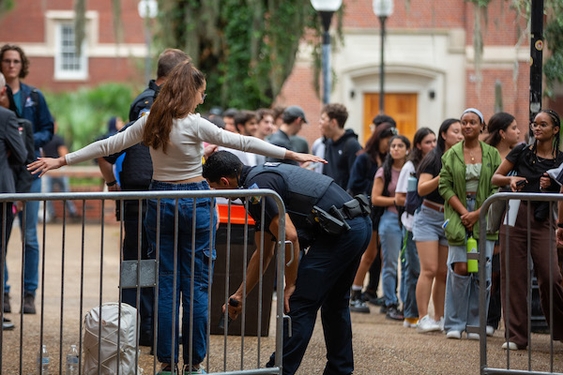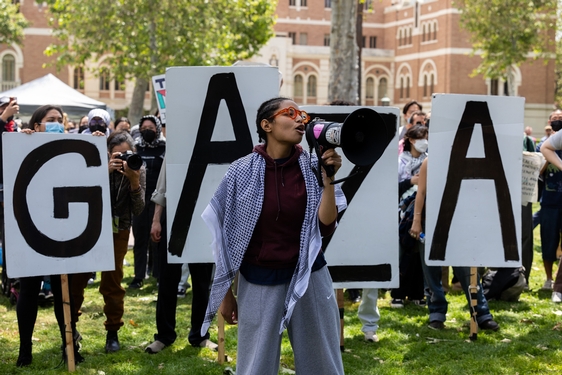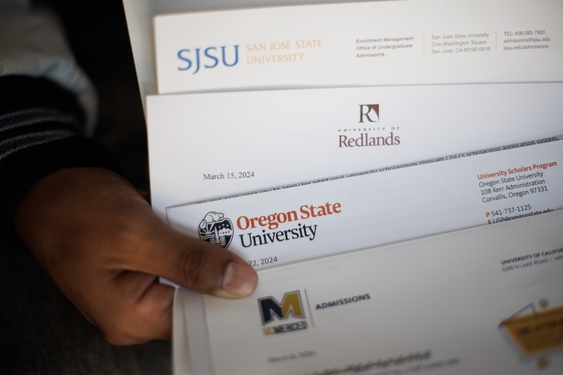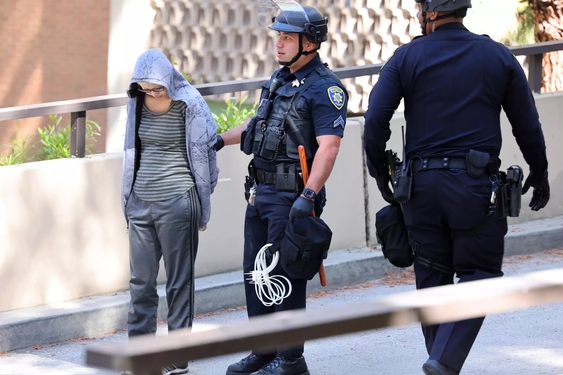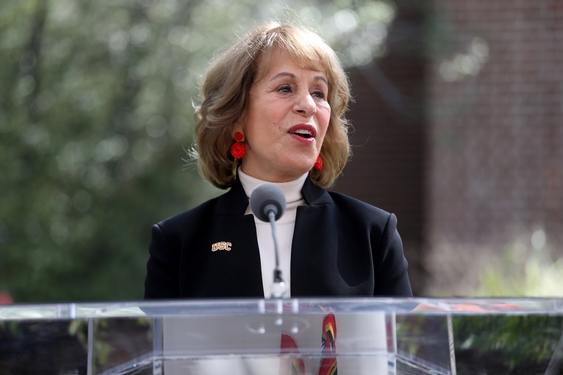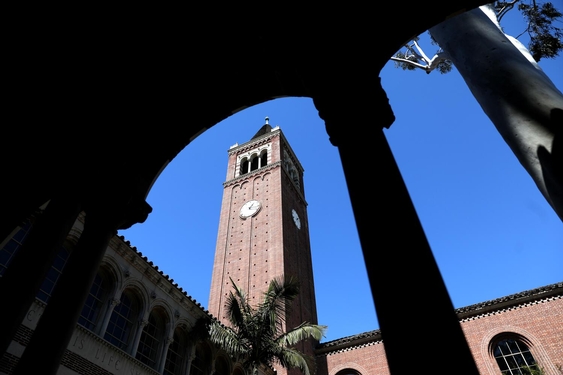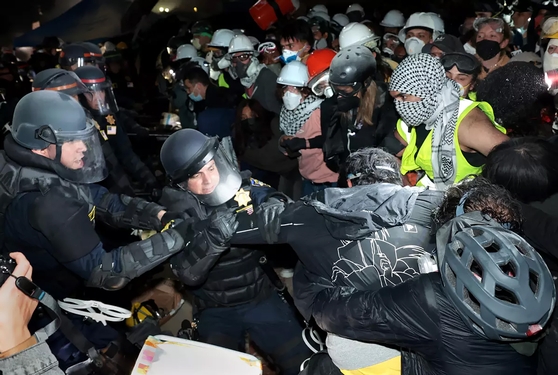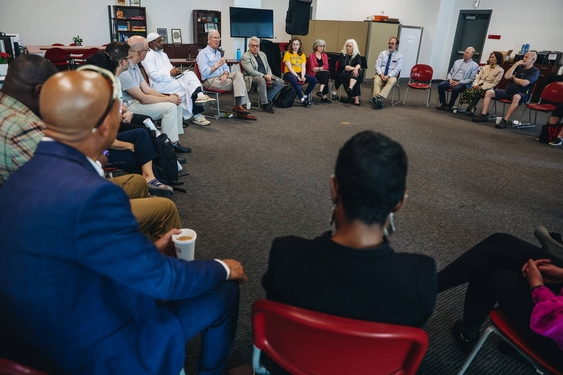A pro-Palestinian student group with backing from the American Civil Liberties Union of Florida has filed a federal lawsuit against state officials, saying they violated students’ free speech rights by moving to ban the group from university campuses.
The Oct. 24 order to disband local chapters of Students for Justice in Palestine came from Ray Rodrigues, chancellor of the State University System, who said last week that legal issues had prompted the state to reassess its position. But the ACLU said in a news release that the order nevertheless “remains in place today.” And the lawsuit, filed Thursday in Gainesville, calls it an “egregious violation” of the First Amendment.
The University of Florida chapter of Students for Justice in Palestine is the chief plaintiff in the case, joined by the ACLU of Florida and Palestine Legal, an organization representing people in the United States who speak in favor of Palestine.
The list of defendants includes Rodrigues, Gov. Ron DeSantis, University of Florida President Ben Sasse, UF’s board of trustees and the university system Board of Governors. DeSantis worked with Rodrigues in issuing the order, and has been using it as a talking point on the presidential campaign trail.
Rodrigues’ order came in response to student protests in solidarity with Palestinians after Israel’s declaration of war following the Oct. 7 Hamas attack on Israel. He issued a memo to all university presidents calling on them to disband two Students for Justice in Palestine chapters, which the governor’s office later said were at UF and the University of South Florida.
Rodrigues cited language in a “toolkit” from the Students for Justice in Palestine national organization that advised people how to demonstrate and referred to the Hamas attacks as “the resistance.” It also stated that “Palestinian students in exile are PART of this movement, not in solidarity with this movement.”
Rodrigues said that wording put local chapters of the group in violation of state laws against giving “material support” to terrorism. At the Republican primary debate last week, DeSantis touted having disbanded the chapters, saying “We’re not going to use state tax dollars to fund jihad.”
The next day, Rodrigues told the Board of Governors he had learned the two chapters were not affiliated with the national group and that each university had provided legal opinions expressing concerns about disbanding them. Rodrigues said the university system would seek its own legal opinions and in the meantime would compel statements from the chapters rejecting Hamas, denouncing violence and stating they would follow the law.
While the federal lawsuit makes note of that development, it says “the looming threat of deactivation” has already chilled the group’s activism efforts. It also alleges that the students involved have not been contacted since the order was issued.
The ACLU said the UF chapter sought their help with representation. The USF chapter has yet to respond with legal action.
Brian Hauss, senior staff attorney with ACLU’s Speech, Privacy and Technology project, called the order a “McCarthyite and blatant attack” on the students’ First Amendment rights. Legal precedent, he said, establishes that independent political advocacy is not material support for terrorism.
“That’s a very dangerous allegation for the government to be throwing around,” Hauss said in an interview.
The lawsuit points to a history of student activism in the state, including a 40-day sleep-in during the 1980s at the University of Florida to protest apartheid in South Africa.
“Throughout American history, students have participated in and benefited from the marketplace of ideas on college campuses, and Florida’s State University System is no exception,” the lawsuit states.
It says UF’s Students for Justice in Palestine chapter was founded in 2009 — before the national group was formed. It’s one of about 200 local chapters, and the lawsuit states it “was founded as a human rights advocacy organization” in response to “the failure of modern society to produce a just and reasonable solution to the Palestine- Israel conflict.”
The chapter’s activities have included hosting teach-ins, vigils, “social events to celebrate Palestinian culture and food and film festivals showcasing Palestinian voices and stories,” the lawsuit says. It states that the group also has issued statements about Black Lives Matter, participated in a boycott of the university’s food court for its association with prison labor contractors and protested the Parental Rights in Education bill, dubbed Don’t Say Gay by critics.
Following the Hamas attacks, the UF chapter issued a statement on its social media account mourning “the loss of innocent Palestinian and Israeli civilian life.” The statement said “the killing of any life is always undignified and heartbreaking” and “the root of violence, apartheid, and occupation under Israel’s far-right government must end for peace.”
The statement also said: “We hope that no more lives, Israeli or Palestinian, are lost. We pray for those who are suffering.”
The government cannot compel speech, so the group’s existence cannot be made contingent on their disavowal of Hamas and violence, the lawsuit argues.
“The First Amendment does not permit the State to dictate the form in which students choose to exercise their rights to free speech and free association,” it says.
Jeremy Redfern, a spokesperson for DeSantis, defended the order in response to the lawsuit.
“Groups that claim to be part of a foreign terrorist movement have no place on our university campuses,” he wrote in an email Thursday. “The governor was right to disband a group that provides material support to a terrorist organization.”
On Wednesday, two Florida lawmakers filed a bill that would make students “promoting a foreign terrorist organization” ineligible for state grants, financial aid or scholarships. It also would require universities to report such students who are on visas to the Department of Homeland Security.
Bill sponsor Sen. Blaise Ingoglia, R- Spring Hill, said in a statement that the Oct. 7 Hamas attacks “pulled back the curtain and exposed rampant antisemitism happening on the campuses of colleges and universities across the country.” In an emailed response to questions, Ingoglia said he’s seen videos of that happening in Florida.
“The First Amendment is not absolute,” he said. “It has limits. For instance, you cannot yell ‘fire’ in a crowded theater. That doesn’t mean you can advocate for senselessly throwing Israeli babies into that same fire. ... Florida taxpayers should not be subsidizing the education of Hamas and terrorist apologists on our school campuses.”
Representatives of the ACLU said the move to ban groups sets a risky precedent.
“If Florida officials think silencing pro-Palestinian students protects the Jewish community — or anyone — they’re wrong,” said Howard Simon, the organization’s interim executive director. “This attack on free speech is dangerous: Today it is pro-Palestinian students; tomorrow it could be any other group the governor dislikes.”
Divya Kumar covers higher education for the Tampa Bay Times, working in partnership with Open Campus.
©2023 Tampa Bay Times. Visit tampabay.com. Distributed by Tribune Content Agency, LLC.


